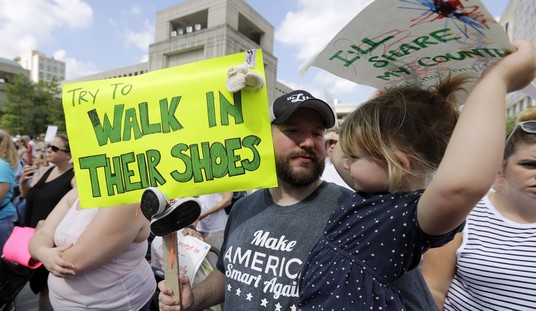Are there any conservatives who haven’t been called a fascist, a racist, or worse by a near complete stranger at a cocktail party after revealing their party affiliation?
Harry Stein knows the feeling.
The author of How I Accidentally Joined the Right Wing Conspiracy (And Found Inner Peace) returns with I Can’t Believe I’m Sitting Next to a Republican!, another adroitly titled tome.
The book recalls how Stein and many others on the Right routinely get called horrible things, or are simply marginalized, for sharing a political belief system that flies in the face of our PC world.
That treatment isn’t limited to stuffy parties or work happy hours. Nearly every field features liberals unwilling to consider “evil Republicans“ as peers. Conservative TV scribe Burt Prelutsky tells the author that liberals don’t “have to listen or discuss. They’re the good guys, and there is no other side.”
I Can’t Believe begins with a great premise, but the first few pages offer a milquetoast refresher course on conservative principles. Where’s the focus, and the puckish sense of humor, promised by the book’s title?
But once Stein starts opening up about his own experiences and that of his right-leaning pals, the book starts to simmer.
I Can’t Believe will shock conservative parents whose children aren’t old enough to attend public school yet. Stein reveals some of the back-and-forth debates between right-minded parents and various school officials over ideologically driven instruction. The lesson? School administrators won’t leave their ideological perches, but it’s a parent’s duty to fight back if only to prevent the problem from worsening.
Conservative professionals not named Limbaugh or Hannity risk plenty by speaking plainly about their political ideas, according to Stein. Right-leaning psychiatrists get ostracized by their fellow doctors. Professors seeking the fast — or even turtle-like — track to tenure better plot out a Plan B.
Simply put, outing oneself as someone who voted for President Ronald Reagan or — gasp — George W. Bush invites a risk that many prefer not to embrace.
The same holds true in Hollywood, and Stein shares a few horror stories from artists who decided either to keep mum about their right-leaning politics or got burned when their colleagues learned too much about their political preferences.
But what about actors like Bruce Willis, Jon Voight, or director David Zucker of Airplane! fame? Everyone who comes out of the ideological closet does so after making their hay in the business, Stein says.
Long-time friendships can buckle, if not completely shatter, when ideology gets in the way, and it too often involves entrenched liberals unable to see their conservative friends as fair-minded or even rational. It’s disconcerting to read how Stein and his father, a dedicated liberal, found their relationship permanently strained after the author shifted from left to right in his 20s.
Stein, a journalist by trade, offers a disheartening anecdote regarding his confrontation with former New York Times executive editor Howell Raines during a journalism confab. Raines blasted Stein for daring to suggest media bias was hurting the industry.
Conservative journalist Clifford May shares his experiences as a former reporter for the New York Times, where editors swatted down his story ideas with alacrity. Apparently, those ideas didn’t fit the paper’s news template.
The most frustrating chapter recalls a smear campaign leveled against Stein himself for daring to defend The Adventures of Huckleberry Finn against racism charges. Here, the media and a falsely outraged executive teamed up to take Stein down.
Stein’s book isn’t always on target, even if his theme will register with many conservative readers.
A brief chapter on Madison, Wisconsin, talk show host Vicki McKenna seems plucked from another book assignment even if McKenna has an enviable fire in her belly for all things conservative.
Stein follows up their chat with a short passage featuring conservative-friendly hangouts in Madison, a slim chapter which only feels like filler.
It also gives the reader pause that, after skewering academics for force-feeding their beliefs onto children, the author applauds one teacher for doing the same with conservative talking points.
What Stein wants is a world where liberals respect conservatives enough to break bread with them without trotting out the “fascist” label. Sounds like a modest request, right?
We may be years away from such a place in society, if it ever comes to pass. But for now conservatives can take solace in the fact that they’re not alone. Stein does a credible job of illustrating precisely that with enough humor to cushion the pain.









Join the conversation as a VIP Member